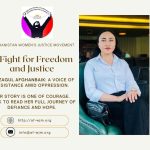
Introduction
In the darkness of fear and oppression, the voice of Afghan women shines like a flame of resistance against silence. Voice of a Woman in Darkness and Hope is an effort to document the unfiltered narratives of women who, amidst exile, torture, and discrimination, have not silenced their cry for justice. What follows is the story of Shahla Arefi’s resilience and perseverance—a woman who stood firm in the heart of resistance and continues to fight, with pain and hope, for the liberation of Afghan women.
1. Introduce yourself and talk about your activities.
I am Shahla Arefi, a women’s rights activist and a member of the leadership council of the Afghanistan Women’s Justice Movement. Before the Taliban’s resurgence, I worked as a teacher in educational, cultural, and artistic programs for girls. I hold a master’s degree in Gender Studies from Kabul University. After the fall of the Republic, I joined the ranks of protesting women and have been fighting alongside my sisters ever since.
2. Why did you protest, and what challenges and obstacles did you face in your struggles?
I decided not to remain silent because of the Taliban’s misogynistic actions that destroyed all the achievements of women. I faced psychological pressure, security threats, and the risk of arrest, but I never stayed silent.
3. In your opinion, have the women’s protests against the Taliban’s restrictions achieved any results so far?
We have succeeded in showing the true face of the Taliban to the world. Our protests have prevented the Taliban from gaining international legitimacy.
4. What plans do you have for continuing the protests?
Street demonstrations, protests in enclosed spaces, online activism, sending protest letters to international organizations, appearing in the media, and holding in-person and online conferences are among our plans.
5. How did you become familiar with the Afghanistan Women’s Justice Movement and join it?
I became acquainted with the Afghanistan Women’s Justice Movement during a street protest on September 3, 2021, and I joined it from that moment.
6. What motivated you to participate in women’s protests?
Injustice and silence became my motivation to raise my voice. I didn’t want to be one of the silent victims. I believe that if we remain silent, future generations will burn in that same silence.
7. Do you remember your first protest experience? How did you feel?
Yes, I remember it vividly. It was in front of the gate of the Ministry of Women’s Affairs, about a week after the Taliban’s takeover. Taliban members tried to beat me, and I would say, “Come, come,” and then run away. We hadn’t invited any media. That day, I thought protests could change the situation. I didn’t know that Afghan women were standing on the front lines of a struggle that would lead to imprisonment, torture, and even assassination.
8. Have you personally been a victim of or witnessed sexual violence or inhumane treatment by the Taliban?
I am among the women who have repeatedly faced physical violence, torture, and detention by the Taliban. During a protest in front of Kabul University, they sprayed pepper spray in my face; I couldn’t see for days, but I continued. In that same protest, women like Parwana Ibrahimkhail, Tamana Zaryab, and her sisters were detained. During a protest against the attack on the Kaj Educational Center, I was severely beaten; protesting women lifted me from the ground. I still suffer from back pain. In August 2023, I was supposed to protest in front of UNAMA’s office, but before joining the protest, I was arrested at my home by Taliban members and taken to the Taliban’s intelligence agency. There, I was tortured so severely that my psyche is still scarred, and I cannot talk about it. That incident is like a tumor in my soul, with no cure. But I am a woman, and I will fight for the girls of my homeland until my last breath.
9. What is your message to the international community?
The world must hear our voice!
We are not victims; we are women who stood firm in the face of oppression, fought, and never stayed silent. Engaging with the Taliban while women are deprived of their most basic human rights is the greatest injustice to Afghan women.
10. In your opinion, what is the solution to the current situation of Afghan women?
The international community must practically support the rights of Afghan women and increase political, economic, and diplomatic pressure on the Taliban. Taliban leaders must be prosecuted and held accountable, and they should not be allowed to travel outside Afghanistan.
Final Words
Shahla Arefi narrative is not merely a personal experience but an echo of the collective resistance of women who have stood against terror, discrimination, and silence. She and the protesting women of Afghanistan are not silent victims but pioneers of awakening and cries for justice.
Documenting these narratives is our responsibility and a way to record the history of women’s resistance in the darkest days of this land.
This interview was documented through the efforts of Nesrin Framarz, an independent researcher with a master’s degree in Criminal Law and Criminology, in collaboration with the Afghanistan Women’s Justice Movement.



